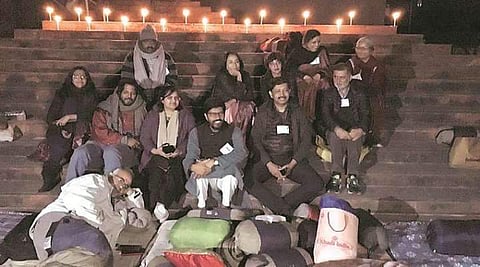

The members of the Jawaharlal Nehru University Teachers Association has been protesting for a few weeks now against the university administration's decision to cut the salaries of the faculty who fail to mark their attendance. But after receiving no positive response from the university's Vice Chancellor, the association has now created a Google Survey to find out if the practice exists in prominent universities abroad.
The survey has been filled by many prominent academicians like Akeel Bilgrami from the University of Columbia, Ben Fine from the University of London, Robert Pollin from the University of Massachusetts-Amherst and James K Galbraith from the University of Texas. "No American university (state or private) has any attendance demands other than holding one’s classes. there is not even a requirement that one has office hours at a regular time," Bilgrami wrote. "These measures will kill research, the freedom to be doing one’s research in the places where it is best done (at home in one’s study, for some), the freedom of movement to make contact with other researchers in one’s field by attending conferences. What they are doing is, at once, both villainous and cretinous," he added.
In agreement with his opinion, Galbraith wrote, "An institution that required its faculty to mark daily attendance would not be a university by any reasonable definition of that term."
The Google Spreadsheet which was initially created a day ago for the JNU faculty and VC to refer, was made public a few hours ago. Until now, 16 professors from all over the world have taken the survey. While everyone opposed the practice of marking daily attendance by teachers/faculty members/academics, no less than 15 of them said that such a system doesn't exist in their universities. Rajah Rasiah, a faculty at the University of Malaya, where an attendance system exists, however, said that in case the faculty forgets to mark their attendance, they are not marked absent if they provide proof. "Academics here are required to mark our attendance on working days using our office computers once each day, which is centrally coordinated. However, in case we forget to mark on any of the working days, we can provide evidence to our heads of departments who are generally generous in approving it," he said.
We also reached out to the JNUTA members to know more about the survey and Professor Avinash Kumar, its secretary had a lot to share. "If Cambridge or Oxford doesn't have something called a mandatory attendance marking, then which best university is the JNU admin referring to? We thought it will be interesting to find it out," he says. He observes that all the academics who took the survey unanimously agreed that the process will eventually destroy research and thinking. "There were instances were classes go on for more than eight hours. Where is the scope for marking attendance and restrict debate and discussion? Learning is a 24x7 process," he says.
He also said that the decision was made by the Vice-Chancellor without any discussion with the faculty, even when there was no issue of teacher absenteeism, "Most teachers and students reside here in the campus. The faculty is always available and schedule classes according to their and the students' convenience. The issue came up while discussing the student attendance and an external member Madhu Purnima Kishwar raised a point of Teachers' attendance," he says, adding that the addition of this rule was completely against the otherwise democratic decision making in the university.
Kumar also notes that none of the central or state universities in Delhi asks the faculty to mandatorily mark their attendance. "It is the same for IITs as well. None of the 21 IITs has any attendance rule for the teachers," he adds.
